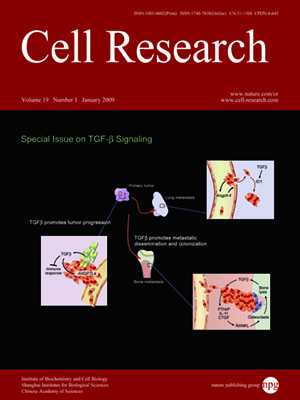
Volume 19, No 1, Jan 2009
ISSN: 1001-0602
EISSN: 1748-7838 2018
impact factor 17.848*
(Clarivate Analytics, 2019)
Volume 19 Issue 1, January 2009: 116-127
REVIEWS
TGF-β signaling in vascular biology and dysfunction
Marie-José Goumans, Zhen Liu and Peter ten Dijke
Department of Molecular Cell Biology and Centre for Biomedical Genetics, Leiden University Medical Center, PO Box 9600, 2300 RC Leiden, The Netherlands
Correspondence: Peter ten Dijke,(p.ten_dijke@lumc.nl )
Transforming growth factor (TGF)-β family members are multifunctional cytokines that elicit their effects on cells, including endothelial and mural cells, via specific type I and type II serine/threonine kinase receptors and intracellular Smad transcription factors. Knock-out mouse models for TGF-β family signaling pathway components have revealed their critical importance in proper yolk sac angiogenesis. Genetic studies in humans have linked mutations in these signaling components to specific cardiovascular syndromes such as hereditary hemorrhagic telangiectasia, primary pulmonary hypertension and Marfan syndrome. In this review, we present recent advances in our understanding of the role of TGF-β receptor signaling in vascular biology and disease, and discuss how this may be applied for therapy.
Cell Research (2009) 19:116-127. doi: 10.1038/cr.2008.326; published online 30 December 2008
FULL TEXT | PDF
Browse 1977


